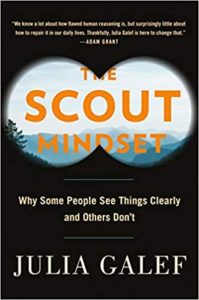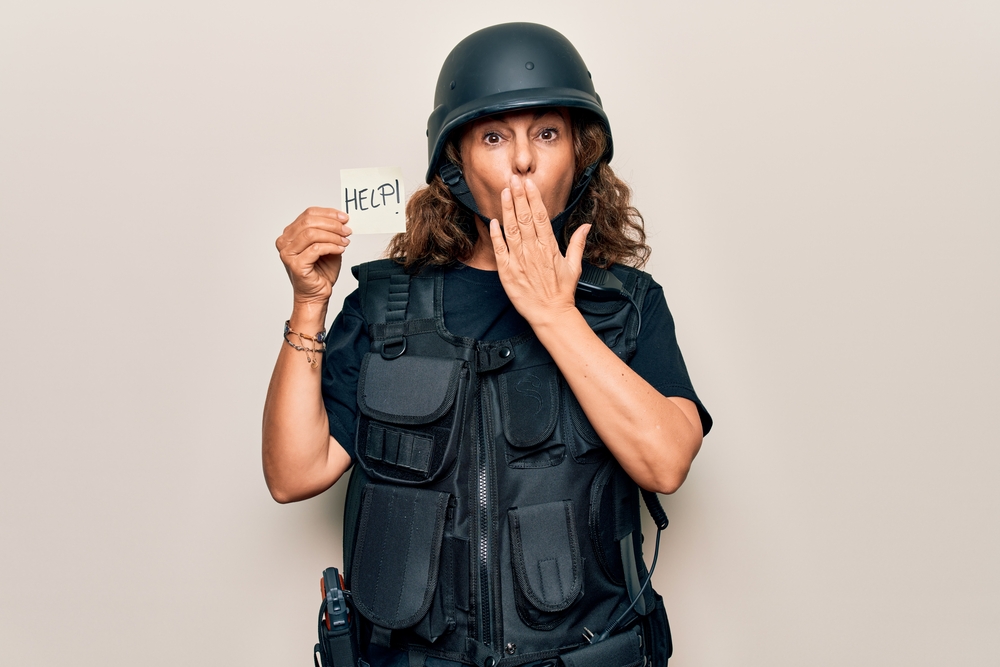Do you approach the world and the challenges it imposes more like a scout or a soldier? What’s the difference? Both are mindsets, and bot are appropriate in particular situations, according to guest Julia Galef. In this episode, host Russ Roberts welcomes Galef to talk about her new book, The Scout Mindset, and explore these questions.

Galef suggests we would be better served by utilizing scout mindset more often than we do. Fortunately, she says, it’s also something we can learn and train ourselves to do. We easily employ scout mindset when, for example, we mentally survey the best way to get to the library. Yet in bigger- and perhaps more significant- situations, such as whether to observes a religious tradition or who to vote for in an upcoming election, we tend to operate with soldier mindset. So, what’s the problem with that, and why might you want to learn to be more scout?
Help us continue the conversation, and let us know your reaction to the prompts below. As always, we love to hear from you.
1- How do you understand the difference between the scout and soldier mindsets? What are some examples of situations in which you thought you needed a soldier mindset, but you didn’t? What might you have done in these instances to be more “scout?” How about the reverse?
2- To what extent do you think Galef is right when she says scout mindset has positive externalities? Would the world really be a better place? Why?
3- How does the scout-soldier contrast help explain why it’s often so hard to say, “I don’t know” and/or admit you were wrong? How might this have been helpful in an evolutionary sense, according to Galef? It it still an adaptive behavior? And how might this episode help Russ with the dinner party conversation on minimum wage we asked about in this Extra?
4- How might scout mindset help you in situations where information is hard to find or not of the sort you need, such as whether to have children?
5- Early in the episode, Roberts confesses he’s become much more pessimistic about the efficacy of widespread economic literacy. How might scout mindset help Russ (and the rest of us!) recover hope? (Or, should we lose hope, and why?) Are we holding our identity as economic educators too tightly?


READER COMMENTS
Steve S
May 27 2021 at 12:35pm
I just want to say that Julia was the most engaging guest on EconTalk I’ve heard in a long time. Munger-level banter between her and Russ, and got at some very interesting topics. Just enjoying to listen to. Good job if you’re reading this Julia.
John Alcorn
May 27 2021 at 4:53pm
Thank you, Amy, for your latest stimulating questions!
I admire Julia Galef’s project (Rationally Speaking). (I picked her as a utility player for my hypothetical team in Arnold Kling’s FITs survey at AskBlog.)
1. Re: The difference between scout and soldier mindsets.
I would clarify or emphasize that both mindsets focus on cognition (belief-formation about facts and mechanisms).
The scout mindset aims at accuracy (within reasonable search costs); acknowledges uncertainty, ambiguity, and indeterminacy; and follows evidence where it leads. Scouts are everyday bayesians. They form beliefs either on a ‘need to know’ basis or to satisfy curiosity. They practice epistemic humility.
The soldier mindset first garners beliefs from others about social issues in order to establish personal identity, and then defends the borrowed beliefs stubbornly. The soldier mindset entwines social epistemology and sense of self.
I have a deep-seated tendency to apply the scout mindset wastefully to small decisions about picking and choosing. I take three times as long as I should to do the weekly grocery shopping because I want to make “the right choice” about each item. But luckily I was never tempted by hyper-rationality in large decisions. I married for love — and I also love my work.
A more prudent scout mindset (or timely mentoring?) would have come in handy in career growth.
2. Re: Good side-effects of the scout mindset.
I am of two minds, about whether inculcation of a scout mindset would make the world a better place.
On the one hand, culture is key to healthy societies. A ‘scout culture’ surely would be a step up from polarization and ‘politics everywhere.’ How to get there?
On the other hand, a scout mindset can’t remedy fundamental problems of democracy; for example, rational voter ignorance and voting for what sounds good. Only wise deference and/or smart reforms (e.g., quadratic voting?) directly address incentive problems in belief-formation in democracy. Absent wise deference and smart reforms, a scout mindset probably would counsel more abstention in democracy. (Garret Jones and Bryan Caplan recommend greater reliance on experts as a counter-weight to citizen belief-formation. However, most experts haven’t acquitted themselves well in the pandemic.)
Julia Galef makes a case that a scout mindset facilitates self-improvement. Again, I am of two minds. Openness to feedback surely helps. But big decisions (career, marriage, children, religion, even politics) shape one’s future self in hard-to-predict ways. Will the future self be sufficiently a scout to refrain from retrospectively judging the fateful choices because one can’t know ‘what might have been’?
3. Re: Why the soldier mindset finds it hard to say, I don’t know.
The soldier mindset connects ideology and personal identity. It tends towards closure in opinions. By contrast, the scout mindset features openness and commitment to epistemic virtues.
Conjectures about evolutionary psychology are, well, largely conjectures. The scout mindset ‘follows the science’ about evolution of species, but says ‘I don’t know’ or ‘maybe’ about hypothetical connections between current mindsets and the psychology of human bands on the savannah tens of thousands of years ago. To borrow a term from philosophy, it hasn’t been established that the scout mindset and the soldier mindset are natural kinds.
However that may be, the soldier mindset clearly isn’t maladaptive in an evolutionary sense, insofar as people who tends towards the solider mindset still have children who grow up to have children etc. Whether Belmont and Fishtown differ in their mixes of scout and soldier mindsets is another question.
4.Re: The value of a scout mindset in making big decisions.
Might a scout mindset help some people to find their way in a timely manner to Bryan Caplan’s book, Selfish Reasons to Have More Kids?
5. Re: The efficacy of economic literacy?
Michael Munger likes to point out that you will find yourself standing alone at cocktail parties if you don’t keep your economic literacy under wraps!
Russ Roberts is pessimistic about the efficacy of economic literacy. My intuition is slightly different. There has been an abdication of the politics of economic literacy in mainstream economics. (Numerous EconTalk episodes feature brilliant exceptions; e.g., Michael Munger, Casey Mulligan, John Cochrane, Angus Deaton.) What Arnold Kling calls “the road to sociology,” and what Bryan Caplan calls “social desirability bias,” and what Jon Elster calls “hard obscurantism” in the social sciences have transformed economics. Twenty-five years ago, after the collapse of communism and the emergence of the internet, I would not have guessed that the economics mindset would shift, gradually but inexorably, to an obsessional search for negative externalities for government to fix. Classical liberalism is no longer a contender for the default framework in economics.
John Alcorn
May 28 2021 at 8:41am
On cue, Arnold Kling has posted an update on the road to sociology in economics.
Comments are closed.